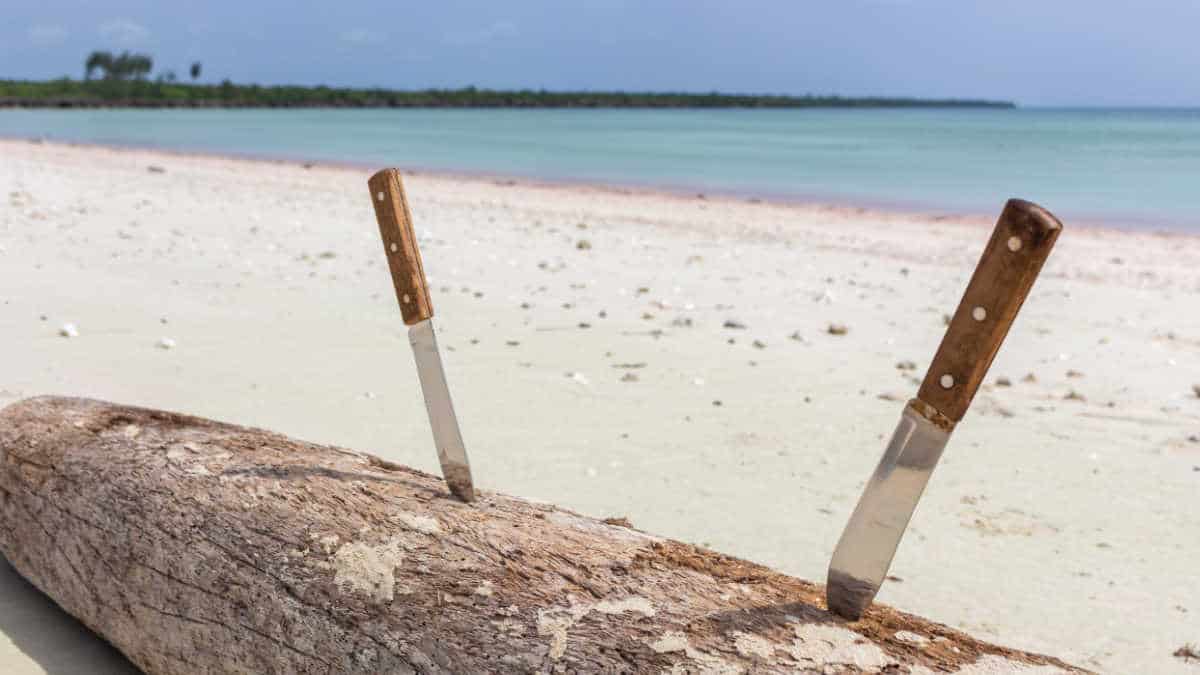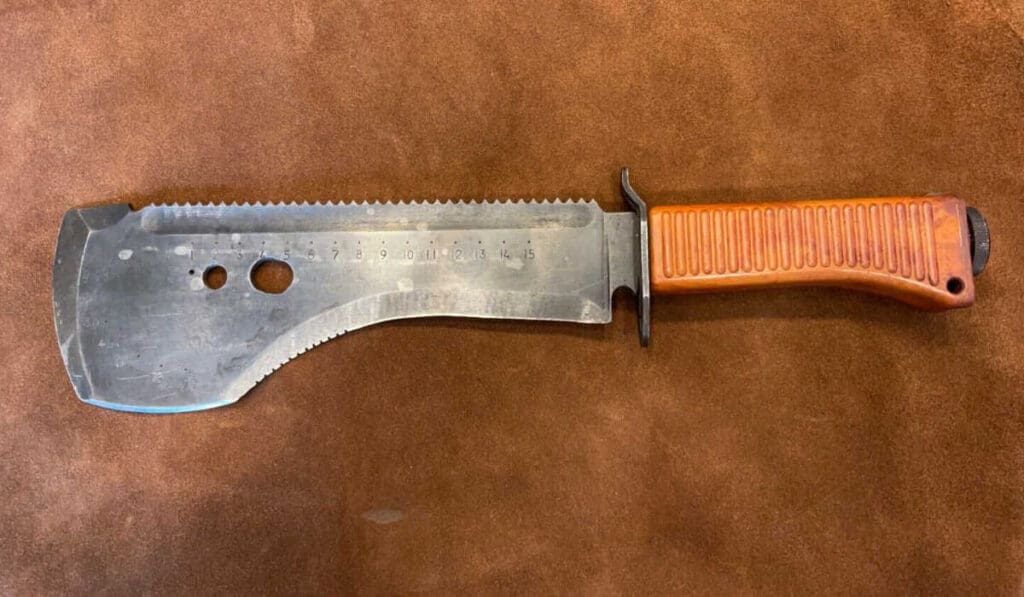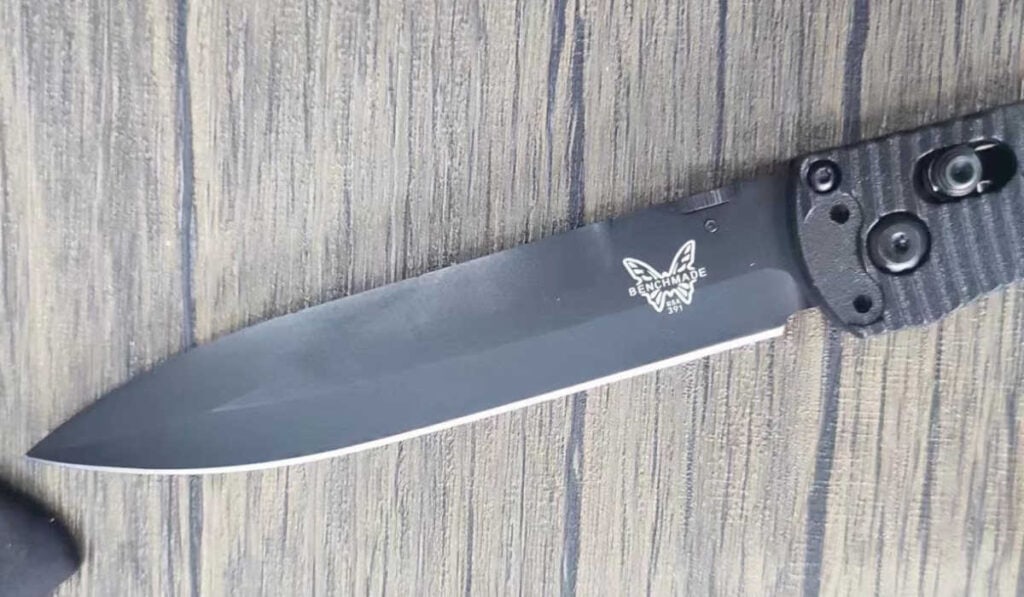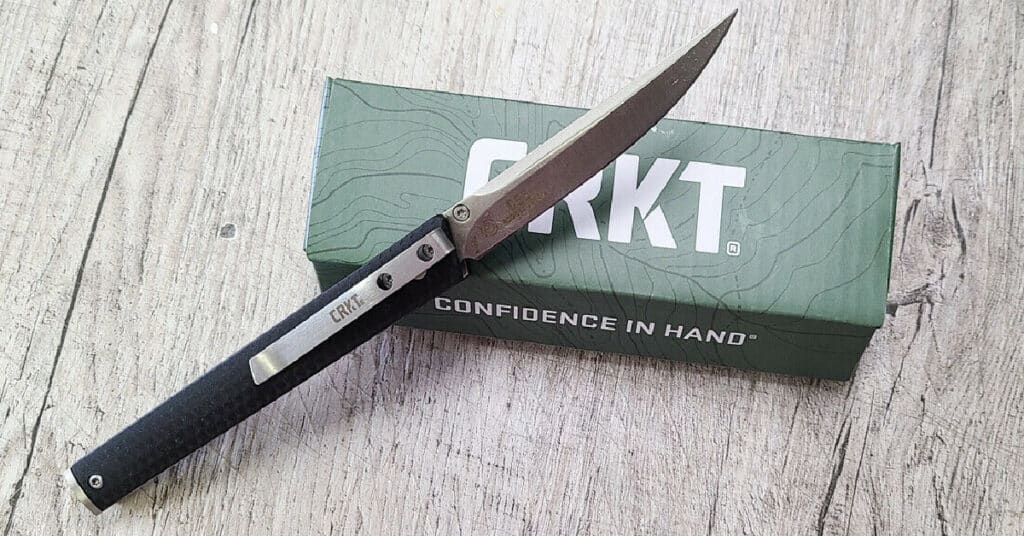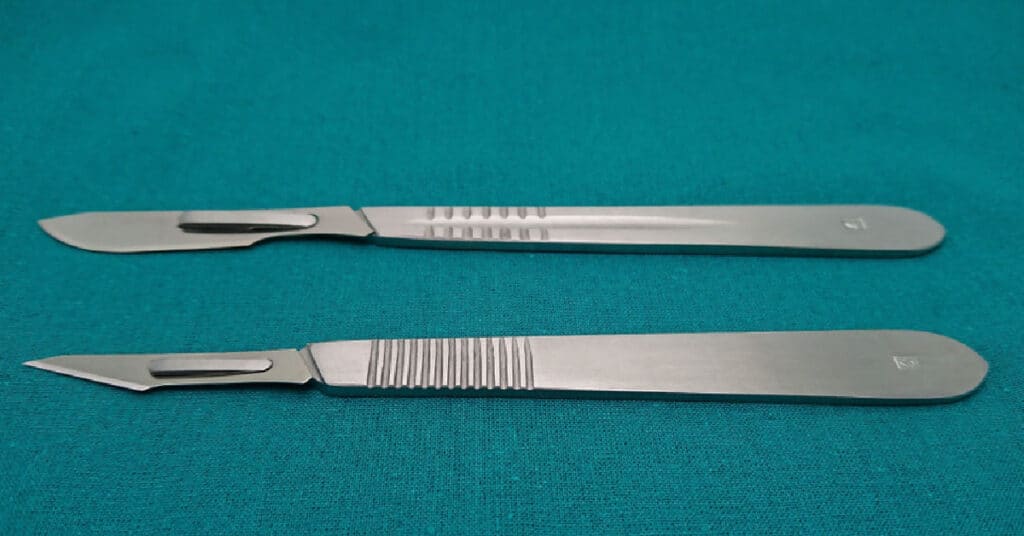Last updated on July 13th, 2023 at 02:32 pm
As an Amazon Associate I earn from qualifying purchases.
Planning a vacation can be exciting, but it’s important to know the rules and regulations when it comes to carrying a knife during your travels. As a knife enthusiast, I’ve faced this dilemma more than once, and it’s always crucial to be aware of the restrictions that vary depending on your destination. This article will delve into the question: “Can I carry a knife on vacation?”
While it would be convenient to have your trusty knife by your side, it’s essential to be mindful of the transportation guidelines that must be followed. For instance, the Transportation Security Administration (TSA) prohibits carrying pocket knives and other sharp objects in your carry-on baggage; however, they are allowed in checked bags. Furthermore, different states and countries have varying laws and regulations regarding the possession and use of knives, which can add another layer of complexity to your travel plans.

So, before you pack your bags, it’s wise to research the specific rules for your destination and how to transport knives legally and safely. Doing so can not only save you from potential legal troubles but also ensure that you can enjoy your vacation without any unnecessary hassles.
Knife Laws in the United States
In the United States, knife laws vary greatly from state to state and even from city to city. As a result, it can be challenging to determine exactly what the rules are when it comes to carrying a knife on vacation. It’s essential to research the specific laws and regulations for each location you will be visiting to ensure you’re in compliance.
For instance, the only federal law regarding knives in the United States is the Switchblade Knife Act of 1958, alongside its 2009 amendment 15 U.S.C. 1244. This law mainly applies to individuals who are traveling between states or internationally.
As I mentioned earlier, laws can also vary greatly at the state level, with different regulations governing knife ownership, possession, and carry. When traveling with a knife, it’s crucial to be aware of the specific laws governing each state and jurisdiction you’ll be passing through.
In addition to state laws, local ordinances may also impact the legality of carrying a knife on vacation. Cities and towns may have their own set of regulations that supersede state laws, and these local rules can greatly affect knife ownership and carry (Check out Traveling with a Knife).
Moreover, there are often limitations on where knives can be carried, regardless of state or local laws. For example, schools are a common location where weapons, including knives, are restricted. This can apply to any educational institution, from kindergarten to university level.
In conclusion, carrying a knife on vacation is a nuanced issue, depending on multiple layers of law that cover federal, state, and local levels. To ensure compliance and avoid potential legal issues, researching and understanding the specific rules of each location you plan to visit is essential. Consider leaving your knife behind if you’re uncertain about the regulations or if it may not be worth the risks associated with carrying it on vacation.
TSA Knife Rules and Regulations

As a frequent traveler, I often find myself wondering what items I am allowed to carry with me when boarding a plane. One such item is a knife, so it’s important to understand the TSA rules and regulations around this topic.
The Transportation Security Administration (TSA) has specific guidelines that address knives and their carriage on an airplane. Generally speaking, knives are not allowed in carry-on luggage, but they can be placed in your checked luggage. When packing a knife in checked baggage, it is important to securely wrap or sheath it to protect baggage handlers and inspectors from injury.
Can I Buy A Knife On Vacation?
As I discovered during my research, buying a knife during a vacation depends on the laws and regulations of the destination. In some locations, the sale of certain types of knives is limited or restricted, with specific regulations concerning locking mechanisms and concealed carry laws. Before making any purchases while on vacation, it’s essential to research the local laws to ensure compliance.
When traveling by air with a knife, regardless of whether you’ve bought it on vacation or are bringing it from home, always remember to pack it in your checked luggage. Since the TSA’s secure website uses HTTPS encryption, represented by a locked padlock, you can trust the information to be accurate and up-to-date.
In summary, although knives can be a valuable tool or souvenir when traveling, it is crucial to comply with both TSA regulations and the laws of your destination. By following these guidelines, I can enjoy my vacation without any complications or concerns related to carrying a knife.
International Knife Laws
When traveling abroad, it’s essential to be aware of the knife laws in the country you are visiting. I’ve researched some general guidelines, but remember, laws can vary depending on the specific location and circumstances.
In Mexico, for instance, any knife can be considered a weapon by police and is therefore illegal to carry in public. Despite this, some tourists have experienced no issues carrying a small pocket knife during their travels.
While traveling through Europe, it’s common for people to carry small folding knives for everyday tasks, like the Victorinox EVOGrip or the Spyderco Dragonfly. However, it’s crucial to research the specific country’s laws, as regulations can differ substantially within the European Union.
In the United States, knife laws can be complex, as they vary from state to state and even city to city. Within a single journey, you may encounter several different sets of laws regarding knife carry. Be sure to research specific laws in areas you plan to visit.
When flying internationally, it’s important to remember that knives are generally not allowed in carry-on luggage on flights. Instead, pack your knives securely in your checked baggage and ensure that they are within the legal limits of your destination country.
If you’re unsure about the specific laws in your destination country, consider having a knife shipped to you rather than attempting to travel with it. This way, you can ensure that the knife you bring is legal and avoid any potential issues during your travels.
Carrying a Knife on Vacation – 11 Destinations
Can Tourists Carry A Knife In Australia
In Australia, carrying a knife is generally not allowed as it may be considered a weapon. However, if you have a legitimate reason, such as using a pocket knife for camping or cutting fruit at the beach, you may be allowed to carry it. Remember that laws may vary between states, so it is important to check the specific regulations in your destination.
Can Tourists Carry A Knife In Costa Rica
As a tourist in Costa Rica, I found that carrying a pocket knife is generally fine. It seems locals often carry machetes, so a small knife for utility purposes like cutting fruit should not be a problem. Again, use common sense and avoid displaying it in public unnecessarily.
Can Tourists Carry A Knife In Canada
In Canada, carrying a pocket knife is allowed for genuine utility purposes. I recommend keeping the knife in a secure area and using it discreetly to avoid any issues. Remember that switchblades and other similar knives are considered prohibited weapons.
Can Tourists Carry A Knife In Egypt
Carrying a knife in Egypt may draw suspicion and be considered a weapon. It would be best for me not to carry a knife while vacationing in Egypt, even for utility purposes.
Can Tourists Carry A Knife In England
In England, there are strict laws regarding carrying knives. A pocket knife with a blade shorter than 3 inches (7.62 cm) is allowed, but anything longer could be considered illegal. During a trip to the beach, I found it best to use smaller blades for cutting fruit or other simple tasks.
Can Tourists Carry A Knife In France
Similarly to England, France has strict knife laws. However, small pocket knives for utility purposes are generally allowed. It is important to be cautious and not use it publicly or in a manner that could be perceived as threatening.
Can Tourists Carry A Knife In Germany
In Germany, carrying a knife is legal if it is a non-locking folding knife with a blade length under 12 cm (4.7 inches). For my beach vacation, I carried a small pocket knife for cutting fruit and had no issues.
Can Tourists Carry A Knife In Mexico
Carrying a knife in Mexico can be risky, as any knife can be considered a weapon by the police and is illegal to carry in public. Nevertheless, having a small knife for personal use at a private location such as a beach house might be acceptable. Personally, I would avoid taking the risk.
Can Tourists Carry A Knife In Rome
In Rome, carrying a knife with a fixed blade or a folding blade longer than 3.5 inches (9 cm) without a justified reason is illegal. If you plan on using a pocket knife to cut fruit at the beach, make sure it meets these requirements.
Can Tourists Carry A Knife In Thailand
In Thailand, carrying a knife in public is generally prohibited and can result in fines or imprisonment. It is better for me to leave my pocket knife at home while visiting Thailand.
Can Tourists Carry A Knife In New Zealand
In New Zealand, there are relaxed regulations for carrying a pocket knife, as long as it is not considered a prohibited weapon. However, be mindful of the purpose and use it discreetly when cutting fruit at the beach, for example.
Prohibited Items and Firearms
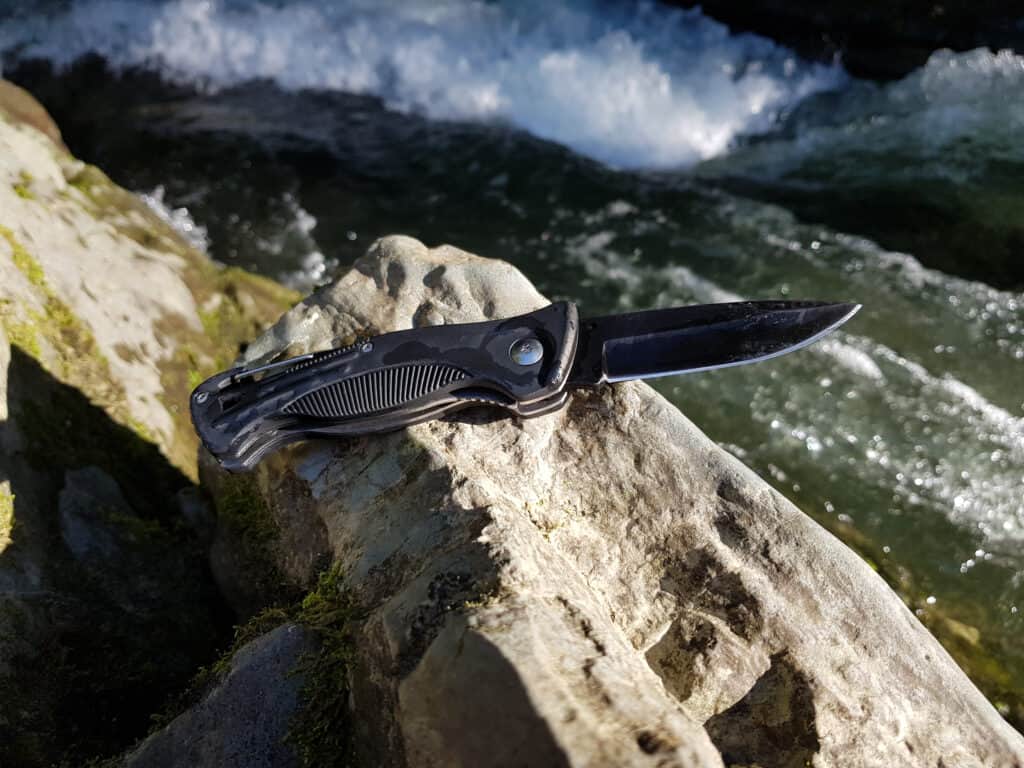
When planning a vacation, it’s crucial to be aware of the prohibited items and firearms regulations to avoid any issues at security checkpoints. I have done my research on TSA guidelines to help you understand what you can and cannot bring on your trip.
First and foremost, knives are generally not allowed in carry-on bags. This includes pocket knives and other sharp objects. However, you can pack knives in your checked baggage, provided they are sheathed or securely wrapped to prevent injury to baggage handlers and inspectors. Remember, plastic or round-bladed butter knives are an exception and can be in your carry-on bags.
Firearms regulations are stringent; they must be unloaded, packed in a locked hard-sided container, and declared to your airline during the check-in process. TSA provides a detailed guideline on firearms to give you more information about transporting them legally and safely. Please note that local laws and regulations also apply, so make sure to check the rules at your destination.
In case someone violates the rules, there could be severe consequences. The TSA may impose civil penalties of up to $14,950 per violation per person. Repeated violations will result in higher penalties. Therefore, to ensure a smooth trip, always double-check your luggage and follow the prohibitions on items and firearms.
I hope this information helps you navigate through the prohibited items and firearms regulations while planning your vacation. Stay informed, and have a safe and enjoyable trip!
Do Sheepsfoot Blades Have A Purpose? (Cuz They’re Ugly…)
Spetsnaz Machetes – Blades Of The Russian Special Forces
What Is The Actual Purpose Of A Spear Point Knife Blade?
CRKT CEO Review – Coolest, Most Worthless Knife Ever?
How Sharp Is A Scalpel? (Is It Sharper Than A Razor?)
Can You Shave With A Knife? (Yes, Here’s How)
As an Amazon Associate I earn from qualifying purchases.

